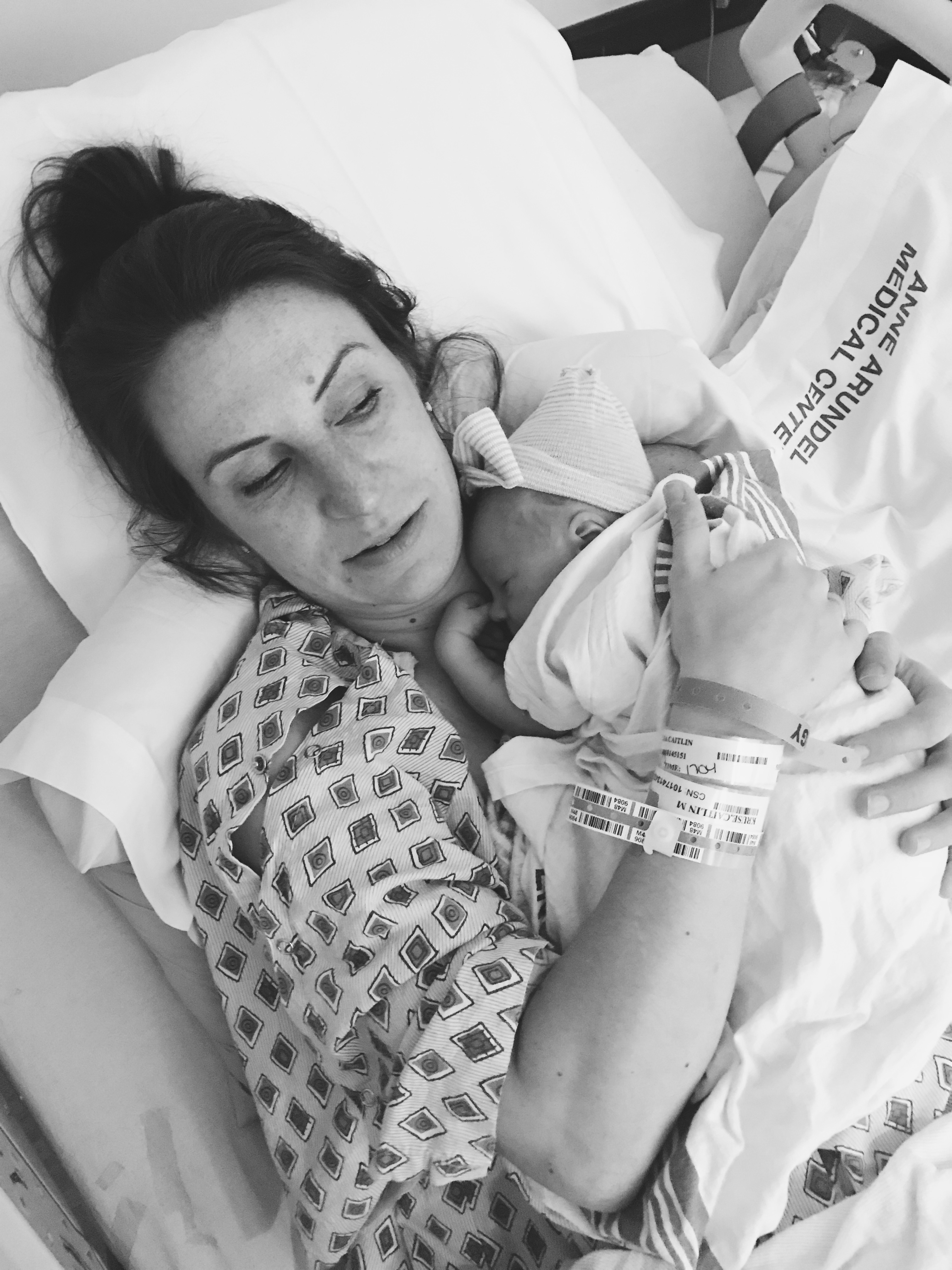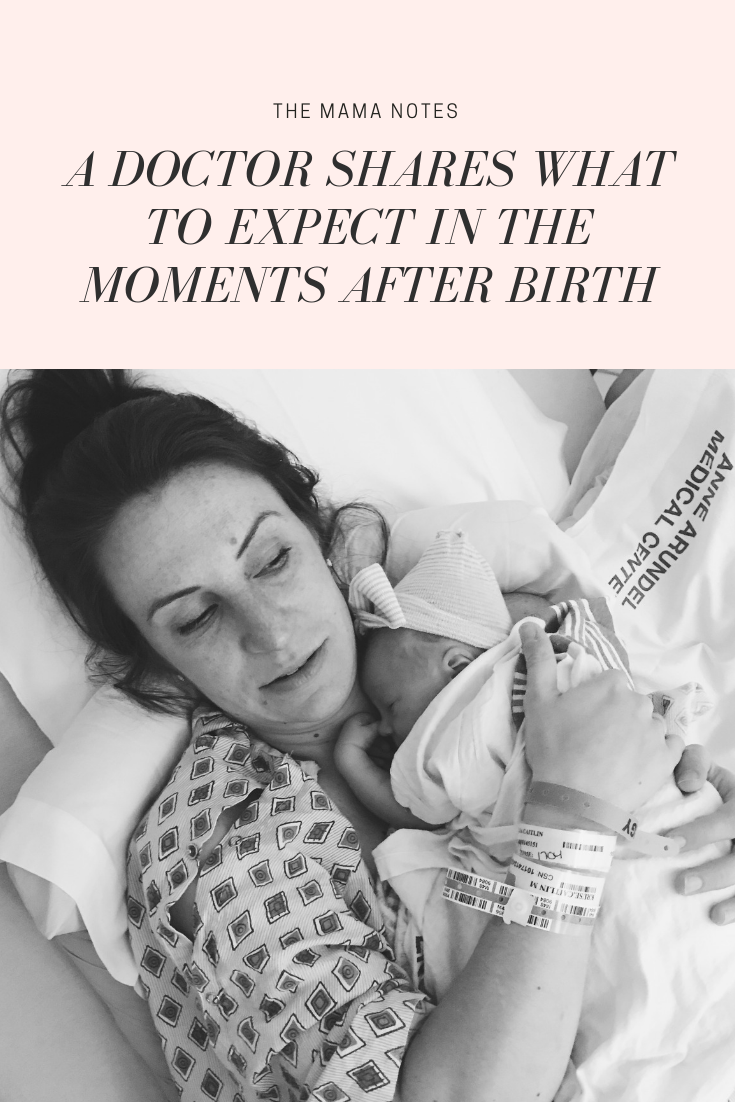Today I’m really excited to share an article with someone who I’ve loved following and getting to know on Instagram over the past year, California based OBGYN –
Dr.Sterling! You hear a LOT of information about pregnancy and labor but I really found the conversation stopped there. Luckily more and more people are talking about postpartum and what happens AFTER your baby arrives. I was surprised to realize how little I knew about what would happen even those first few hours and days in the hospital. Like I always say, education is key in preparing yourself for motherhood before it happens. I couldn’t be more grateful to Dr.Sterling for sharing her knowledge about what to expect in the moments after giving birth.
Dr. Christine Sterling is a board-certified ObGyn and ‘mom on a mission’ to prepare women for the realities of pregnancy, birth and the 4th trimester. Once Dr. Sterling and all of her friends started having babies she realized that all women, not just her close girlfriends, need a BFF who happens to be a doctor. She is here to nurture and support you throughout your reproductive journey. For more about Dr. Sterling check out TheSterlingLife.com
You have been waiting for this moment for months, perhaps years.You have endured 10 months of pregnancy with countless sleepless nights. You have dreamed of this moment.
Your baby has arrived.
Many women are surprised by the events that unfold in the moments and days after birth. You will not be one of them.
I am here to tell you the truth about what comes after birth. As an ObGyn I have walked with hundreds of women across the threshold from pregnancy to motherhood. I have walked over the threshold myself. On the other side of the door is a challenging, overwhelming and delirious time punctuated with profoundly beautiful moments. It does not wait for you to catch your breath or rest. The 4th trimester arrives full-force at moment one.
Let’s make sure you are ready!
Baby Is Out Now What?
Birth is an overwhelming physical and emotional experience. Afterwards, the work is not over. In fact, it is just beginning…
Deliver Placenta
The placenta is the organ that allows you to nourish your baby in pregnancy. After baby delivers the placenta must follow. This usually occurs within 30 minutes. It is smaller than baby but still may require some effort on your part to deliver. Some women require extra assistance from their doctor if they do not delivery their placenta within 30 minutes.
Before you deliver over half a liter of blood is going to your uterus every minute. After delivery that blood flow needs to decrease drastically. To help decrease bleeding your doctor or midwife will massage the top of your uterus over your belly. Calling it a massage is somewhat misleading. You may not notice much if you have an epidural, but if you don’t it can be pretty uncomfortable.
Repair Lacerations
This is the part of delivering a baby most of us dread. The truth is that most of us will have some tearing, especially with your first baby. It is also true that most of the tearing will be minor, heal well, and cause no long term problems.
But first you have to get through the repair (or stitching together) of any lacerations.
During the repair your provider will ask you stay still and keep your legs open. This is so we can properly visualize what we are doing. This is easier said than done. If you are unmedicated you will likely need some numbing injections. If you have an epidural hopefully this experience will be painless for you. But as not every epidural is created equal, this can be a challenging experience even if you have one.
As someone who had an unmedicated birth and repaired hundreds of lacerations myself, my personal and professional advice is— do not fight the experience. Take a deep breath, relax your body and surrender. It will be over so much faster if you do.
I recommend asking your doctor for details about your laceration. We are often so distracted by our new baby and the overwhelming experience of birth that we don’t even know where we have stitches. If your provider doesn’t explain- ask!
A Word About Debriefing
Birth can be an overwhelming and sometimes traumatizing experience. If you need clarity on anything that happened during your labor or delivery do not be shy about asking your nurse, doctor or midwife for a debriefing. This debriefing can help you process the experience and come to terms with your birth story.
The Golden Hour
The first hour after birth is a sacred and important time for the new family. During this time, if both are stable, baby will be placed on your bare chest. This practice is called skin-to-skin and is beneficial for both baby and mom. The full assessment of your newborn, including weighing, takes place after this first hour.
What Happens After a Cesarean?
Once your surgery is complete you and your baby will be taken to a recovery room. Sometimes baby leaves the Operating Room a few minutes ahead of you, sometimes at the same time. You will be in the recovery room for several hours. During this time, if both you and baby are stable, you and baby will be skin-to-skin. Your nurse will perform frequent checks of your uterus and “massage” your uterus to help prevent bleeding. Your nurse will also be checking your vital signs and making sure you are stable to go to your postpartum room. Expect your movement to be very limited in the first few weeks. You don’t realize how often you use your abdominal muscles until you have an abdominal surgery. I’ve been there. It’s not easy but it will get better. Be patient with yourself and your recovery. You are going to need a lot of help.
The Breastfeeding Journey Begins
Your breastfeeding journey will begin within the first few hours of birth. Not all babies latch right away so try not to stress if you don’t get a latch right away. Breastfeeding is a skill and it takes time to learn. You also have to teach this skill to a brand-new human with zero life experience. If it has been awhile since you’ve been a newbie at something this can be frustrating. Your nurse (and often a lactation consultant) will be available to teach you and baby the ropes.
What Does It Feel like After Baby Is Out?
In a word— strange. Bump is still there, baby is gone. For the first few days you will experience afterpains which are strong uterine cramps that feel eerily similar to labor contractions. Breastfeeding often causes these cramps to increase.
You will also bleed for approximately 6 weeks after birth. The bleeding is typically heavier than a period for the first 1-2 days and then decreases gradually thereafter. Your nurse and doctor will evaluate your bleeding while you are in the hospital to ensure it isn’t too heavy.
If you’ve had a vaginal delivery expect sitting and walking to be uncomfortable for the first week or so. I highly recommend a donut pillow for anyone who has had tearing in childbirth. If you are interested in other items that will aid your healing once you leave the hospital, check out my Ultimate Postpartum Kit Checklist.
Many women experience discomfort with urination after birth and some have issues controlling their bladder. As if that wasn’t enough, the first bowel movement, whether you’ve had a vaginal delivery or a cesarean, can be an experience. At most hospitals, after birth medications to help prevent constipation are standard.
All of these symptoms should steadily improve. If you are unsure if what you are experiencing is normal do not be shy about asking your doctor.
How Long Do I Stay in the Hospital?
Most women spend the first 2 days after birth in the hospital and longer if they’ve had a cesarean. Unfortunately, the hospital is not always the most restful place. Between your nurse, food services, housekeeping, baby’s pediatrician, your doctor, the lactation consultant, the birth certificate people, and your visitors it can feel like a revolving door, leaving you little time to rest.
So why stay 2 days? Baby will typically cluster feed, feeding on-and-off for hours on end, in the first 48 hrs. This can be a physically and emotionally overwhelming experience, especially if your are a first-time mom.
As an ObGyn I had planned to leave as soon as I crossed the 24 hour mark. I thought— “I’ve got this. I know what I’m doing” Ha! How wrong I was. I stayed the 2nd night at the behest of my midwife and I am so glad I did. My daughter cluster fed on the second night and I was bawling my eyes out. I couldn’t get a latch that wasn’t excruciatingly painful. Then my angel nurse whipped out a nipple shield and it all got better. In addition to the breastfeeding help, it can be reassuring to have your meals, medications and everything brought to you all the while having someone, mainly your nurse, on the look-out for any complications.
To maximize healing in the hospital I recommend bringing some items from home to help create a more serene environment. If you are wondering what things your need to bring to the hospital and what you don’t check out my Ultimate Hospital Bag Checklist.
You Deserve the Best
I hope this helps you feel more prepared for all that comes after birth. What follows certainly isn’t easy. There will be difficult days and even more difficult nights. But I will promise you this— it gets easier. You don’t bounce back but you do grow forward into a new normal.
You got this momma! I’m here for you. Feel free to reach out to me on Instagram. We are in this together.


What to Expect in the Moments After Birth
VIEW THE COMMENTS